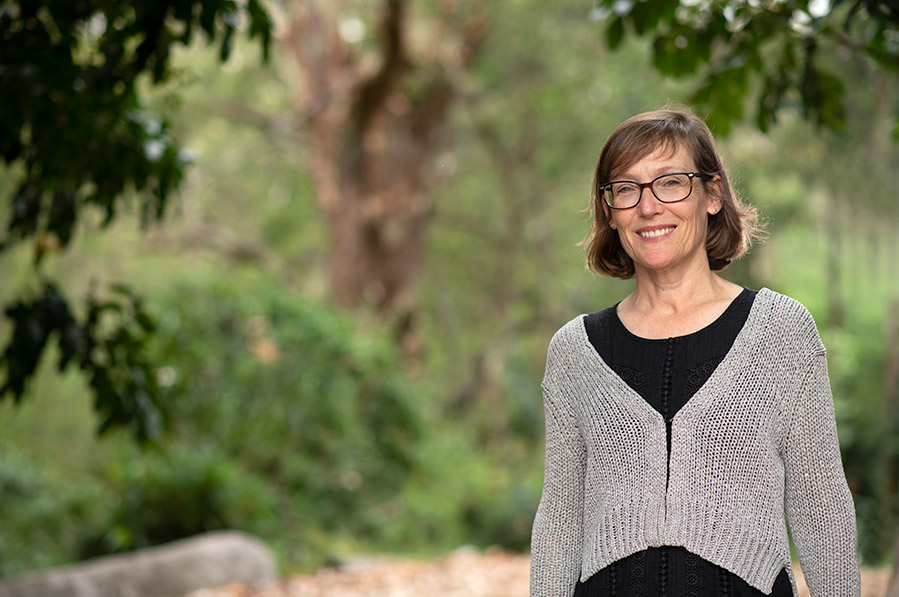Researcher Highlights
Meaty matters
Dr Nancy Cushing
Dr Nancy Cushing is an environmental historian who is examining the underlying beliefs and aims that led, by the end of the colonial period, to a typical Australian diet based around the heavy consumption of beef and mutton.

"One of the selling points of coming to Australia during the colonial period to people in Britain was having meat three times a day," explains Cushing.
"Australians in that period ate more meat than almost any other country on earth per capita. The only one that was ahead of Australia was Argentina. But, if you look at similar places, culturally, such as Britain, they were maybe eating a quarter of the amount Australians did."
Cushing says being a vegetarian and an environmentalist made her start to think about the choices that are made around the eating of meat – which has an impact on our fellow animals, and uses enormous amounts of land and crops that could be used for direct consumption and water.
"I also read about the kangaroo cull – the hunting of kangaroos in Australia is the largest hunt of land-based mammals in the world. Every year, millions of kangaroos are killed," said Cushing.
"In Victoria, there is currently a two-year trial of selling the culled kangaroos as pet food. Until this year, the legislation said that the dead animals had to be buried. In other parts of mainland Australia, those animals are collected, put into chiller containers, butchered and the meat is used. Most of it goes for pet food.
"A lot of the kangaroo meat is exported. So it is acceptable in other markets, in some cases as a cheap filler meat for sausages, in others as a gourmet game meat. Until recently, a lot of it went to Russia, as well as all over Europe, and an increasing market is in China.
"Some kangaroo is consumed by people in Australia – but it's extremely low amounts.
"One of my aims for this project is to go back to the past and say: 'Was there a time when Australian's quite happily ate kangaroo and how did that play out. Who was eating it, how were they preparing it, what did people think of it, and – as it faded away – when and why?'
"There are lots of accounts from the colonial period of how much people enjoyed kangaroo meat, that it was very tasty, it was a luscious meat, it created a lovely gravy – so very positive accounts of eating kangaroo.
"The question is then: when we have beef in feed lots, emitting methane as they digest their food and requiring huge amounts of water, why are we not eating the meat we have here and reducing our environmental footprint?"
Cushing says she is looking to test her idea that an anti-kangaroo push developed during the colonial period, because there were vested interests in establishing sheep and cattle.
|
"The supply of provisions within the colony was the first industry that was established here; the first thing that created wealth and power," said Cushing.
"I think, potentially, there was a campaign against eating kangaroo, and we can see that in Tasmania, for example, where the government regulated the ownership of kangaroo hunting dogs.
"As long as people can live outside of the cash economy – eating bush meat and gathering and so on – they're independent of the state and of the whole economic system."
Cushing's project, which is supported by a Merewether Scholarship from the State Library of New South Wales, is the first step in a larger undertaking, in which she hopes to extend her research up to the present, looking at Australians' preference for a narrow range of meats and suggesting that a more diverse diet could be healthier for individuals and the planet.
"If I can influence the debate around modern meat eating choices, even a very small amount, I would like to try to do that – to bring up the possibility of eating more kangaroo," she said.
"There are people in Australia who are 'kangatarian' – who will only eat kangaroo meat, because it's not farmed. They haven't been bred, they haven't been kept in captivity, it's just one shot and that's their only interaction with people – so they see eating kangaroo as an ethical choice.
"However, the conditions under which kangaroos are killed are debated as inhumane, that the way the meat is handled may be unhealthy, and that they may have parasites.
"So I'm not saying that this is a perfect solution, but I think it's something we should think about as part of a bigger picture; about how we are interacting with other animals."
The University of Newcastle acknowledges the traditional custodians of the lands within our footprint areas: Awabakal, Darkinjung, Biripai, Worimi, Wonnarua, and Eora Nations. We also pay respect to the wisdom of our Elders past and present.
